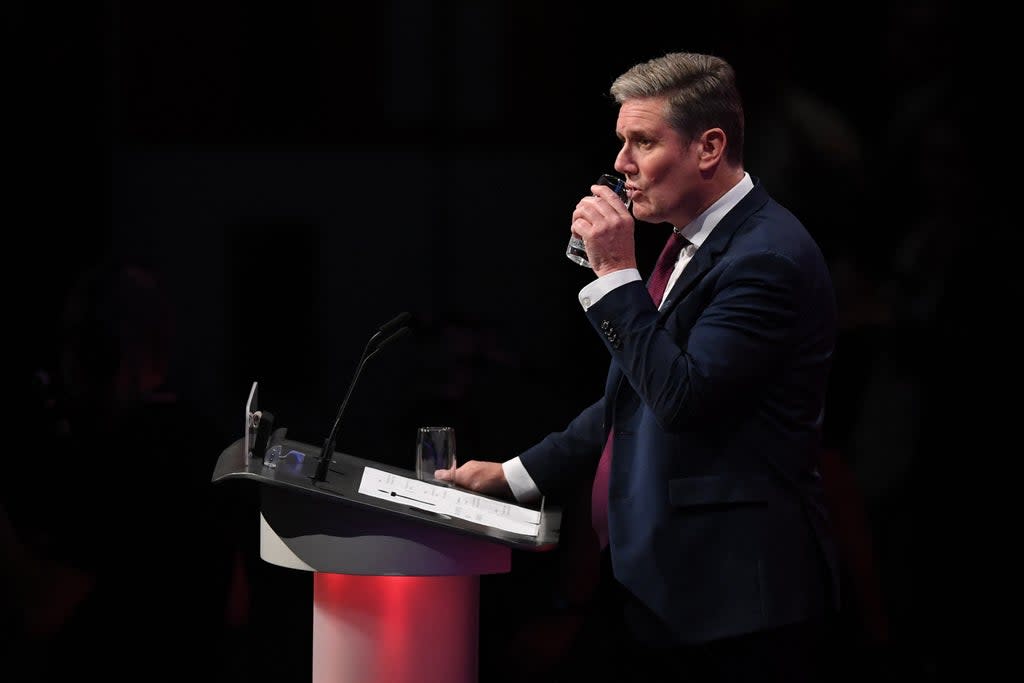Keir Starmer’s speech was his most relevant yet – is Labour back in the game?

In the real world, people are queueing for petrol. In the Brighton bubble – aka the Labour Party conference – they stand in line for Sir Keir Starmer. Or, if they’re that way inclined, Jeremy Corbyn.
They tut and shake their heads about Angela Rayner’s potty mouth, they bicker over the merits of an electoral college, and they bitch about someone called Andy McDonald.
But lest you start to think this is a political party sliding into irrelevance, the leader’s speech yesterday was arguably his most relevant yet.
His determination to win was a novelty after Labour’s four successive general election defeats. He explained who he was: a serious, determined man by contrast with a prime minister he variously described as “trivial” or a “tool”.
For his friends in the hall, the emotional heart of the speech came first when he talked about how the NHS looked after his mum in her dying days, and then when he recounted the story of John and Penny Clough’s campaign for victims of rape and domestic abuse after the murder of their daughter. As the couple looked on from the audience, he told his party that having met them as director of public prosecutions, he rolled up his sleeves and helped them change the law.
And far from drowning him out, allies reckon the hecklers helped him define his central message that Labour is no longer a protest party. “Shouting slogans or changing lives” may have been a well-prepared put-down but it was an effective one.
Sir Keir and his colleagues hope this will prove a pivotal moment. And while few voters will have been hanging on his every word, conference speeches can certainly help make the political weather.
Some have already compared Sir Keir’s focus on climate change investment with Harold Wilson’s “white heat” of technology moment at Labour’s 1963 conference. It was Wilson’s first speech to delegates since his election (and this was Sir Keir’s first in-person effort), and set out how Britain could prosper in a postwar world. The parallels with the emergence from the pandemic are hard to ignore, though Wilson was reckoned to have failed to live up to his rhetoric.
Of course, when it comes to barn-storming conference rhetoric, few surpass Margaret Thatcher, and several of her speeches made a dramatic impact. In 1980, “the lady’s not for turning” spelt out her determination to liberalise the economy, and the phrase itself came to define her premiership.
Unsurprisingly, few in Brighton this year referenced Thatcher, but Neil Kinnock’s 1985 conference in Bournemouth was on the lips of several. It was then that the leader of the opposition lambasted the Militant tendency, the Trotskyists in the party, as he spoke of the “grotesque chaos of a Labour council – a Labour council – hiring taxis to scuttle round a city handing out redundancy notices to its own workers”.
He, like Sir Keir, was heckled from the floor, in Kinnock’s case by Derek Hatton, the deputy leader of Liverpool Council, who accused him of lying. Kinnock’s courage proved momentous for the party, ultimately paving the way for a Labour government.
No doubt, next week the Conservatives will make capital out of the divisions exposed like a receding tide on the Brighton seashore this week. But think of two more recent conference speeches, and Labour will be relieved at where they’ve ended up.
Iain Duncan Smith’s “quiet man” speech failed to silence his critics, and he was ousted from the leadership less than three weeks later. Theresa May limped on for a couple of years after her disastrous 2017 conference effort, but the writing was on the wall – or the letters which tumbled off the wall – as she was interrupted by coughing fits and a prankster handing her a P45.
This week, Sir Keir looked more Kinnock than May. A close shadow cabinet ally messaged afterwards: “It is a turning point. Resetting the party. Done more this week than anyone has done in the last decade to get Labour back on track. People really buzzing – a great way to end conference.”
His critics argue that he needs to get better at being Her Majesty’s official opposition. Why, for example, wasn’t he more vocal about the fuel crisis earlier in the week? The voters he needs to convert might have taken more notice of that than a lengthy oration.
But there’s real optimism in the upper echelons of the party. They say Labour is no longer shouting from the sidelines – it’s back in the game. Winning that game is another matter entirely.
Cathy Newman presents Channel 4 News, weekdays, at 7pm

 Yahoo News
Yahoo News 
